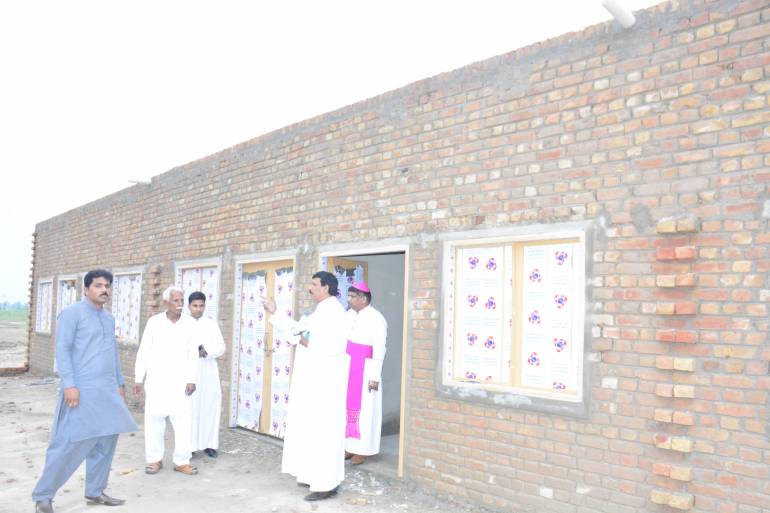Church reaches out to brick kiln workers in Pakistan

In Pakistan, about 20,000 brick kilns employ about 4.5 million people. They often suffer from poverty and live in the most deplorable living conditions without access to basic amenities.
They become bound in generational bonded labor due to the small loan they received for some need—marriage, illness, medicine, deaths, children, desperation, household expenses, and other concerns. These factors keep them and their generation in perpetual debt.
Those families caught in a spiral of loan and bonded labor slavery in Pakistan are compelled to produce more than 1,500 bricks daily to pay back loans to the proprietors of the kilns.
Bricks are used for everything from constructing homes to maintaining bridges and canals.
However, those low-income families that make bricks are not informed of their debt amounts, the length of their employment, or the interest rate on their loans.
NGOs fight to release millions of people from contemporary slavery as this debt bondage grows worldwide.
One such Non-Government Organization is the Society for Human Development, which has worked with brick kiln workers for the last 15 years in Pakistan, a Muslim-majority country.
Initially, it was about fighting for the rights of one of the poorest groups, brick kiln workers. It began with better salaries for the workers, then getting them their National Identity Cards and later their Social Security Cards.
When the Society for Human Development staff found the children uneducated, it started crash courses for the kids of brick kiln workers. That process continues and is growing.
Children of people experiencing poverty make fast progress in literacy classes.
Now the Society for Human Development is working on housing for kiln workers.
People have named the place “Bonnieabad” after the founder of the Society for Human Development, Father Bonnie Mendes, a veteran priest of Faisalabad Diocese in the eastern province of Punjab, Pakistan.
He is also the former executive secretary of the Pakistani bishops’ National Commission for Justice and Peace and the former head of Caritas Asia. He is also the executive secretary at the Federation of Asian Bishops' Conferences (FABC).
Some years ago, he bought five acres of land for people with low incomes in Pakistan.
With the help of SOS France, 40 houses measuring 24 feet were multiplied by 45 feet each. That comes to four perches.
People have been paying for the land. The project was blessed by Bishop Joseph Indrias Rehmat of the Faisalabad Diocese on June 1, 2022.
On June 1, Bishop Rehmat came to see the progress this year. So far, 35 houses have been built. The organization hoped to construct many more places.
He opened three new literacy centers with the help of individual donors from Italy.
On June 17, Cardinal Joseph Coutts, former Archbishop of Karachi, Pakistan, blessed a free dispensary and distributed different kinds of plants among the poor.
He instructed them to look after the plants and explained to people with low incomes the benefits of having a wide variety of trees.
The beneficiaries of the housing project are grateful to Father Mendes and the Society for Human Development.
"Housing is one of the great needs of the poor," said Babu Farman, a catechist.
An elderly woman said, " I dreamt of a house; now I see that dream will be fulfilled."
The contribution of the people to the housing project is in kind. They are paying as much as they can, said Father Mendes.
Over 100,000 brick kilns are located throughout South Asia, with almost 20,000 in Pakistan.
According to the World Bank, they are responsible for 91% of the pollution in some cities.
Pakistan's Environmental Protection Agency shut down about 70 kilns due to overpopulation in November 2022.
Many brick kilns are found close to urban areas, dramatically increasing air pollution. Despite being severely unorganized and uncontrolled, Pakistan's brick industry contributes 1.5% of the country's GDP.
The most common brick-firing technology in South Asia, Fixed Chimney Bull's Trench Kilns, is utilized in Pakistan's traditional brick industry to bake hand-made bricks.
This brick production method is among the dirtiest and is to blame for several social and environmental issues, such as deforestation, cardio-respiratory illnesses, air pollution, and climate change.
Radio Veritas Asia (RVA), a media platform of the Catholic Church, aims to share Christ. RVA started in 1969 as a continental Catholic radio station to serve Asian countries in their respective local language, thus earning the tag “the Voice of Asian Christianity.” Responding to the emerging context, RVA embraced media platforms to connect with the global Asian audience via its 21 language websites and various social media platforms.














